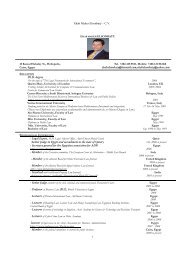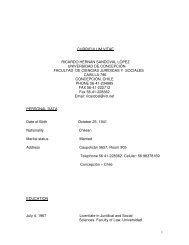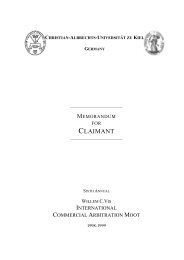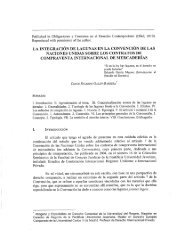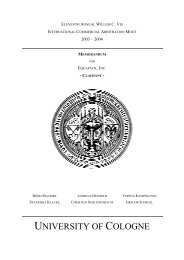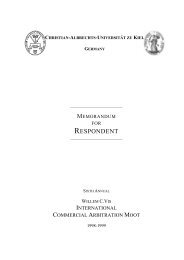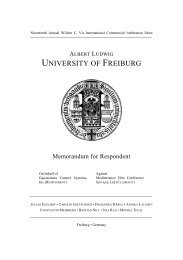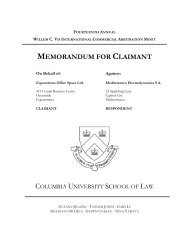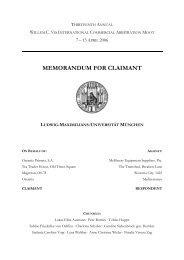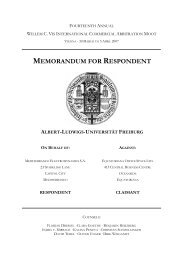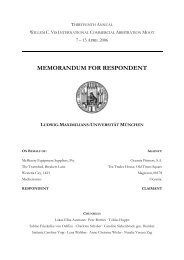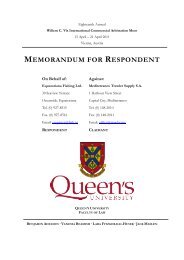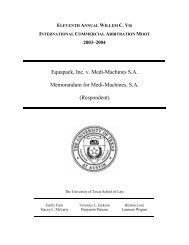MEMORANDUM FOR RESPONDENT - CISG Database
MEMORANDUM FOR RESPONDENT - CISG Database
MEMORANDUM FOR RESPONDENT - CISG Database
You also want an ePaper? Increase the reach of your titles
YUMPU automatically turns print PDFs into web optimized ePapers that Google loves.
1. This Tribunal does not have jurisdiction as an ad hoc arbitration<br />
tribunal.<br />
i. This Tribunal must be constituted as an ad hoc tribunal for it to<br />
have jurisdiction.<br />
27. As the Claimant has conceded, if this Tribunal decides that the arbitration agreement<br />
should be upheld as an ad hoc arbitration, a new ad hoc tribunal would need to be constituted<br />
[Claimant’s Memo, para. 58]. This Tribunal may not claim jurisdiction as it was not<br />
constituted as an ad hoc tribunal.<br />
28. This Tribunal was constituted by the CICA as an institutional arbitral tribunal. This<br />
can be seen from the Claimant’s request for arbitration pursuant to Article 36 of the CICA<br />
Rules [Letter from Langweiler conveying claim]. There is no mention of Article 78 of the<br />
CICA Rules, which is meant to apply to ad hoc arbitration. Further, the CICA had requested<br />
for fees in accordance with Article 1(1) letter B of its Schedules of Arbitral Fees and<br />
Expenses [Letter from Court of Arbitration to Office Space acknowledging receipt of claim].<br />
That Article applies to institutional arbitration. Had the CICA constituted this Tribunal as an<br />
ad hoc tribunal, it would have requested for fees pursuant to Article 8 of its Schedules of<br />
Arbitral Fees and Expenses.<br />
29. When parties decide to switch from institutional to ad hoc arbitration, a new<br />
arbitration agreement is required [Redfern/Hunter, para. 3-66]. Where a tribunal has been<br />
constituted for institutional arbitration, it cannot decide subsequently that it has jurisdiction<br />
for an ad hoc arbitration. For example, in ICC Case No. 3383 of 1979, after arbitration was<br />
instituted under the auspices of the ICC, the parties decided that they wanted ad hoc<br />
arbitration. Although the same arbitrators were retained, the parties had to withdraw from<br />
ICC jurisdiction and reconstitute a fresh arbitration on an ad hoc basis. This demonstrates<br />
that once an institutional tribunal decides that the arbitration agreement only provided for ad<br />
hoc arbitration, it has to find that it has no jurisdiction to determine the dispute.<br />
ii. The Model Law cannot be the basis for this Tribunal’s jurisdiction.<br />
30. Furthermore, it cannot be argued that this Tribunal may derive jurisdiction as an ad<br />
hoc tribunal from the Model Law, just because the procedure of the appointment of the<br />
arbitrators in the present case mirrors the default position in Article 11(3) of the Model Law.<br />
In Star (Universal) Co Ltd. v. Private Company “Triple V” Inc. (Hong Kong), the court held:<br />
11



